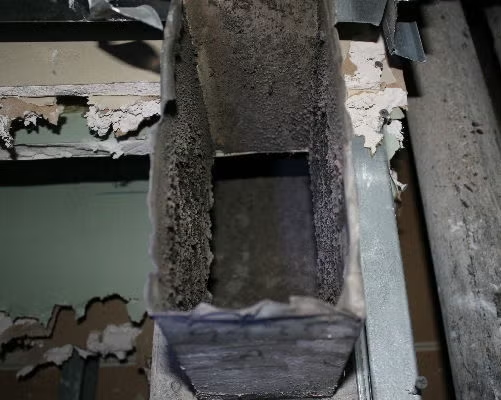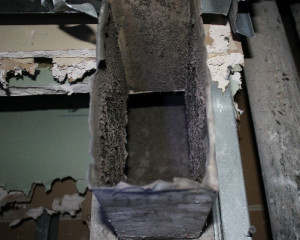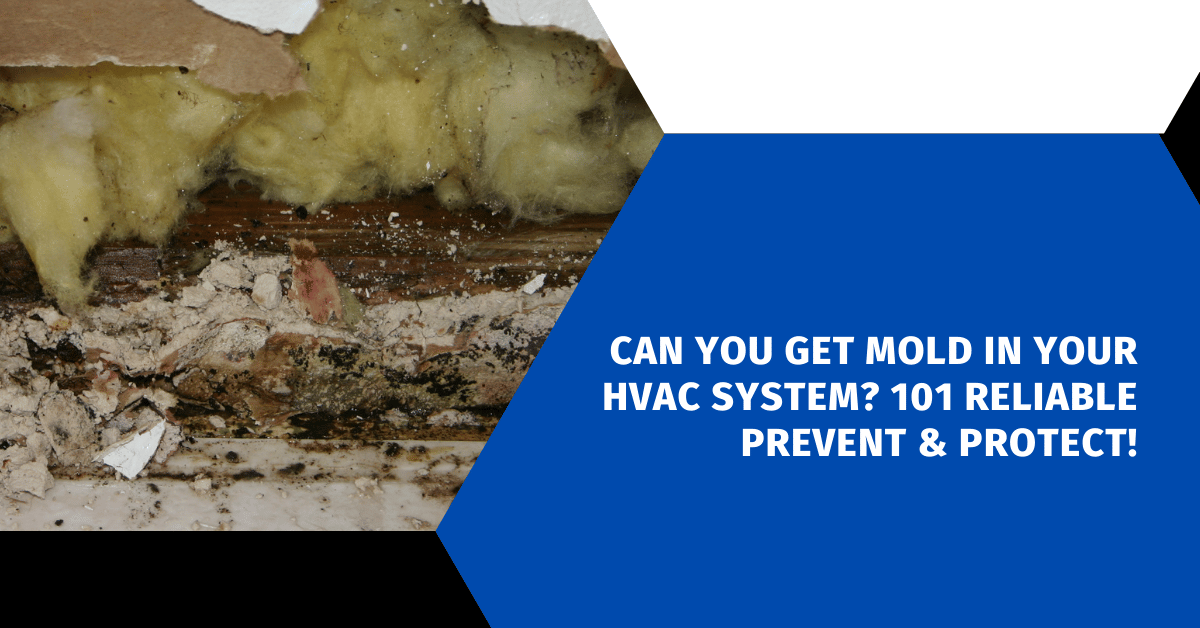Affiliate Disclosure
HVAC Guide Guys is a participant in the Amazon Services LLC Associates Program, an affiliate advertising program designed to provide a means for sites to earn advertising fees by advertising and linking to Amazon.
Can You Get Mold in Your HVAC System? This can lead to poor indoor air quality and potential health issues for occupants. Regular maintenance and cleaning of the HVAC system can help prevent mold growth and ensure the system operates efficiently.
Yes, it is possible to have mold in your HVAC system. Mold can grow in the damp and dark areas of the system, such as the evaporator coils, condensate drain pan, and air ducts.
Table of Contents

Credit: www.goodway.com
The Hidden Enemy: Mold In HVAC Systems
Explore Our HVAC Shop
Looking for top-rated HVAC tools, parts, and accessories? Visit our shop and find the perfect solution for your needs.
Visit the ShopMold in HVAC systems is a hidden enemy that can cause health problems for you and your family. Yes, you can get mold in your HVAC system, especially if you don’t maintain it properly. Regular inspection and cleaning can help prevent mold growth.
When it comes to keeping our homes comfortable, we rely on our HVAC systems to do the job. But did you know that lurking within these systems could be a hidden enemy? Mold, a common household problem, can find its way into your HVAC system, posing potential health risks and affecting indoor air quality. In this article, we will explore the signs that your HVAC might be hosting mold and why mold loves your HVAC.
Signs Your HVAC Might Be Hosting Mold
If you suspect that your HVAC system is harboring mold, there are several signs to look out for. Identifying these signs can help you take prompt action to address the issue. Here are some common indicators:
- Musty Odor: If you notice a persistent musty smell when your HVAC system is running, it could be a sign of mold growth. Mold releases volatile organic compounds (VOCs), which can produce an unpleasant odor.
- Allergy Symptoms: Mold spores can trigger allergic reactions, such as sneezing, coughing, and itchy eyes. If you or your family members experience these symptoms when the HVAC is operating, it may indicate mold contamination.
- Poor Air Quality: Mold in your HVAC system can compromise indoor air quality, leading to respiratory issues and exacerbating existing conditions like asthma. If you notice an increase in respiratory problems among household members, mold in your HVAC system could be the culprit.
Why Mold Loves Your HVAC
Mold thrives in damp and dark environments, making your HVAC system an ideal breeding ground. Here are a few reasons why mold loves your HVAC:
- Moisture: HVAC systems generate condensation, especially during the cooling process. This moisture, if not properly drained or dried, can create a conducive environment for mold growth.
- Ductwork: The ductwork in your HVAC system can accumulate dust, debris, and moisture, providing a perfect habitat for mold to flourish.
- Inefficient Filtration: If your HVAC system’s air filters are not regularly cleaned or replaced, they can become clogged with dust and debris. This can obstruct airflow and create a breeding ground for mold.
In conclusion, mold can infiltrate your HVAC system, posing health risks and compromising indoor air quality. By being aware of the signs of mold contamination and understanding why mold loves your HVAC, you can take proactive measures to prevent and address this hidden enemy.
:strip_icc()/GettyImages-1387280366-2000-1f48fb7d650844c198445a9d34f62677.jpg)
Credit: www.bhg.com
Health Risks Associated With HVAC Mold
When it comes to the health risks associated with HVAC mold, it is crucial to understand the potential dangers that mold in your heating, ventilation, and air conditioning (HVAC) system can pose to your well-being. Mold growth within the HVAC system can lead to a variety of health issues, ranging from mild respiratory problems to severe long-term complications.
Respiratory Issues And Allergies
Mold spores circulating through the air ducts can trigger respiratory problems such as coughing, wheezing, and shortness of breath. People with allergies may experience heightened symptoms when exposed to mold, including nasal congestion, sneezing, and itchy or watery eyes.
Long-term Health Complications
Prolonged exposure to mold in the HVAC system can lead to more serious health issues over time. This includes chronic respiratory conditions, persistent headaches, fatigue, and even neurological problems. Additionally, individuals with compromised immune systems or pre-existing respiratory conditions are at higher risk of developing severe complications.
Explore Our HVAC Shop
Looking for top-rated HVAC tools, parts, and accessories? Visit our shop and find the perfect solution for your needs.
Visit the ShopCommon Mold Hotspots In HVAC Systems
Ductwork Dilemmas
The ductwork in HVAC systems can be a prime location for mold growth. Moisture often accumulates in the ducts, especially if there are leaks or insufficient insulation. This damp environment provides the perfect conditions for mold to thrive and spread throughout the system. Regular inspection and maintenance of the ductwork is crucial to prevent mold issues.
The AC Unit: A Breeding Ground
The AC unit itself can also become a breeding ground for mold. Condensation and moisture from the cooling process can build up in the unit, creating an ideal environment for mold growth. Additionally, if the unit is not properly maintained, dust and debris can accumulate, providing organic material for mold to feed on. Regular cleaning and maintenance of the AC unit is essential to prevent mold infestations.
Preventative Measures For Mold Growth
To prevent mold growth in your HVAC system, ensure proper ventilation and humidity control. Regularly change filters and schedule professional cleanings. Address any leaks promptly to avoid moisture buildup that can lead to mold. Regular maintenance is crucial in preventing mold in your HVAC system.
Regular Maintenance Schedules
Regular maintenance schedules are crucial for preventing mold growth in your HVAC system. It is recommended to have your system checked and cleaned by a professional at least once a year. This includes cleaning the air ducts, replacing filters, and checking for any leaks or damage in the system. By keeping your system well-maintained, you can ensure that it is running efficiently and not providing a breeding ground for mold.
Humidity Control Strategies
Controlling the humidity levels in your home is another important preventative measure for mold growth. High humidity levels can lead to moisture buildup in your HVAC system, providing the perfect environment for mold to grow. You can use a dehumidifier to control the humidity levels in your home and ensure that they are below 60%. Additionally, make sure that your system is properly ventilated to allow for proper airflow and reduce moisture buildup.
Other Preventative Measures
There are several other preventative measures that you can take to reduce the risk of mold growth in your HVAC system. These include:
- Keeping your home clean and free of clutter to reduce dust and debris buildup in your system.
- Sealing any leaks or cracks in your ductwork to prevent moisture from entering your system.
- Installing UV lights in your system to kill any mold spores that may be present.
By following these preventative measures, you can help to ensure that your HVAC system remains mold-free and provides clean, healthy air for you and your family to breathe.
Explore Our HVAC Shop
Looking for top-rated HVAC tools, parts, and accessories? Visit our shop and find the perfect solution for your needs.
Visit the ShopDIY Mold Detection Techniques
When it comes to maintaining a healthy indoor environment, being able to detect mold in your HVAC system is crucial. Here are some DIY mold detection techniques you can use to keep your home safe and clean:
Visual Inspections: What To Look For
Visual inspections are the first line of defense against mold in your HVAC system. Look for visible signs of mold such as dark spots, musty odors, or unusual moisture accumulation.
At-home Testing Kits: Pros And Cons
At-home testing kits offer a convenient way to detect mold in your HVAC system, but they may not always provide accurate results. Pros include easy to use kits, while cons may involve limited accuracy.
Professional Mold Remediation For HVAC Systems
Mold can grow in HVAC systems, leading to health issues and poor air quality. Professional mold remediation can effectively remove mold and prevent future growth, ensuring a safe and healthy environment.
Mold growth in HVAC systems is a common problem that can cause serious health issues. When left unaddressed, it can spread throughout your home and contaminate the indoor air. While some homeowners may attempt to clean the mold themselves, it’s important to know when it’s time to call in the professionals. Professional mold remediation services have the expertise and equipment to safely and effectively remove mold from your HVAC system.
When To Call The Experts
If you suspect that your HVAC system has mold, it’s important to act quickly. Some signs of mold growth in your HVAC system include a musty odor, visible mold growth, and increased allergy symptoms. If you notice any of these signs, it’s time to call in the experts. Professional mold remediation services will perform a thorough inspection of your HVAC system to determine the extent of the mold growth.
What To Expect During Remediation
During mold remediation, the professionals will take several steps to ensure that your HVAC system is safe and free of mold. First, they will isolate the affected area to prevent the spread of mold spores. Then, they will use specialized equipment to remove the mold from your HVAC system. This may involve cleaning or replacing contaminated components. After the remediation process is complete, the professionals will perform a final inspection to ensure that all mold has been removed.
In conclusion, mold growth in your HVAC system is a serious issue that requires professional attention. If you suspect that your HVAC system has mold, don’t hesitate to call in the experts. By taking action quickly, you can protect your home and your health from the harmful effects of mold.
Explore Our HVAC Shop
Looking for top-rated HVAC tools, parts, and accessories? Visit our shop and find the perfect solution for your needs.
Visit the ShopInnovative Technologies Fighting Mold
Mold growth in HVAC systems can be a major concern, affecting indoor air quality. However, there are innovative technologies that can effectively combat mold and ensure a healthier living environment.
UV Lights: A Modern Solution
UV lights installed in HVAC systems eliminate mold spores by disrupting their DNA structure.
Air Purifiers And Filters
Air purifiers and filters are essential in trapping mold spores and preventing their circulation.
Maintaining A Mold-free HVAC System
Preventing mold in your HVAC system is crucial to maintaining indoor air quality. Regularly changing filters, controlling humidity levels, and scheduling professional inspections can help prevent mold growth and keep your HVAC system clean and mold-free. Regular maintenance is key to a healthy HVAC system.
Best Practices For Homeowners
It is crucial for homeowners to follow best practices to prevent mold growth in their HVAC systems.
Regularly clean and replace air filters to ensure proper airflow and reduce the risk of mold buildup.
When To Schedule Professional Inspections
Professional inspections should be scheduled annually to detect any mold growth or issues early on.
Consider scheduling an inspection after floods or water damage to prevent mold contamination.
Key Points:
– Keep humidity levels below 60% to discourage mold growth.
– Ensure proper ventilation in all areas of the home to prevent moisture buildup.
– Address any leaks or water damage promptly to prevent mold growth.
– Consider using dehumidifiers in damp areas to reduce moisture levels.
Remember, regular maintenance is key to maintaining a mold-free HVAC system and ensuring clean air quality in your home.

Credit: www.goodway.com
Explore Our HVAC Shop
Looking for top-rated HVAC tools, parts, and accessories? Visit our shop and find the perfect solution for your needs.
Visit the ShopFrequently Asked Questions
Can Mold Grow In HVAC Systems?
Yes, mold can thrive in HVAC systems if moisture is present. Condensation in the system can create a damp environment ideal for mold growth, which can affect air quality and system efficiency.
How Does Mold Get Into HVAC Systems?
Mold can enter HVAC systems through outdoor air intakes, moisture buildup in ducts, or from contaminated components. Once inside, the system can distribute mold spores throughout the building via the air supply.
What Are The Signs Of Mold In HVAC?
Visible mold growth on vents, musty odors from the vents, and allergy-like symptoms when the HVAC is running are common signs of mold in the system. Regular inspections and maintenance can help detect and prevent mold growth.
Can Mold In HVAC Cause Health Issues?
Yes, mold in HVAC systems can lead to respiratory issues, allergies, and other health problems, especially for individuals with sensitivities. Proper cleaning, maintenance, and addressing moisture issues can help mitigate these health risks.
Conclusion for Can You Get Mold in Your HVAC System
Being proactive about mold in your HVAC system is crucial. Regular maintenance and inspections can prevent potential issues. Remember to change filters, clean ducts, and monitor humidity levels. By taking these steps, you can ensure a healthy and efficient HVAC system for your home.

